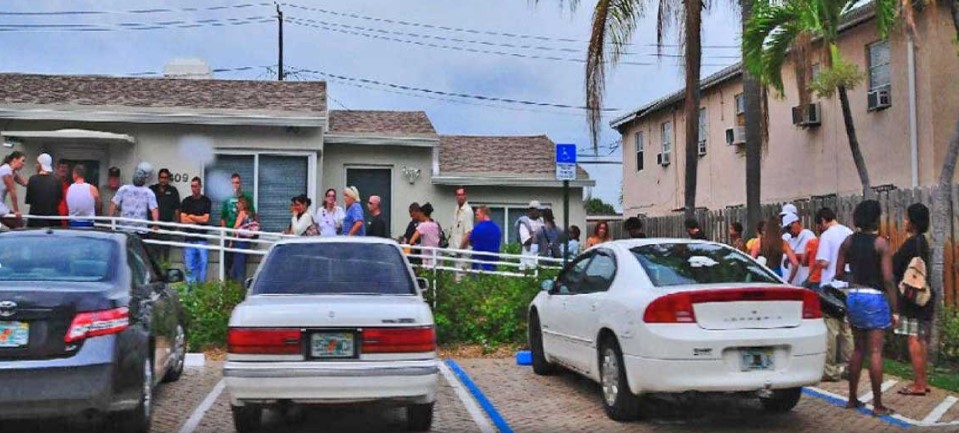
Investigation Reports. Agents from the U.S. Drug Enforcement Administration and local police are sweeping across Florida, arresting individuals suspected of illegally prescribing painkiller pills and other prescription drugs to patients who often have nothing wrong with them.
Authorities say there are hundreds of pain clinics throughout the region that are involved in the illegal activity. The clinics are also known as “pill mills” because people come there to get prescriptions, often with no questions being asked.
Thousands of people from all over the Eastern Seaboard were coming to South Florida to buy prescription drugs illegally. People will come in vans, eight or ten people at a time. They get the scripts, and they go back. When they return home, the pills usually end up on the black market.
IMPORTANT NOTE: Not all pain management clinics are engaged in criminal activity. Many of the clinics across the state are operating legally and employ trained personnel and doctors who treat patients who legitimately suffer from pain.
Some pain clinics have represented themselves as primarily focused on pain management, but they knowingly and intentionally conspired to distribute and dispense oxycodone pills in connection with their operation.
Investigations show individuals and their businesses participating in a drug trafficking conspiracy that distributed massive amounts of addictive controlled substances from pain management clinics. These are not just crimes of greed; these are crimes that make this country’s opioid crisis even worse.
As the fight against the opioid crisis continues, State and Federal Authorities are working to shut down Pain Clinics that are really just fronts for criminals who divert pharmaceutical drugs and hook a new generation of people with an addiction.
Many of these investigations stem from business operations of what was, in essence, a ‘pill mill’ rather than a pain clinic or medical practice focused on pain management.
Dr. John Gayden Jr. Ten people fell victim to a Brevard County doctor who, back in the early 2000s, ran one of the nation’s most active pill mills out of an unassuming office in unincorporated Indialantic.
According to court documents and evidence presented at trial, James Moss was a part-owner and CEO of Florida Pharmacy Solutions, a Florida-based pharmacy. David Copeland of Tallahassee, Florida, was a part-owner and senior sales manager at FPS, and Michael Gordon was a lead sales representative. Moss, Copeland, and Gordon, along with their accomplices, engaged in a practice known as “test billing” to develop the most expensive combination of compounded drugs to maximize reimbursement from TRICARE. Moss, Copeland, Gordon, and their accomplices targeted physicians who treated TRICARE beneficiaries and paid bribes and kickbacks to physicians and salespeople to encourage the referral of prescriptions to FPS.
Crespo used his position as an HHS-OIG Special Agent working on healthcare fraud cases to protect his friend and associate Diaz Gutierrez’s Oxycodone operation. Crespo was acquitted on the conspiracy to traffic oxycodone charge.
From November 2016 to July 2020, previously convicted patient recruiters Jorge Diaz Gutierrez, Yandre Trujillo Hernandez, and Anais Lorenzo were part of the illegal Oxycodone trafficking scheme involving patients, pharmacies, and medical clinics. The patient recruiters sent patients to selected medical clinics to obtain Oxycodone prescriptions that the patients did not need. Once the patients obtained the prescriptions, they would give them to the patient recruiters in exchange for money. The patients would fill the prescriptions at pharmacies selected by the recruiters and sell the Oxycodone pills (at a markup) to third-party street dealers.
SAINT AUGUSTINE, FLORIDA. Dr. Scott Andrew Hollington was accused of overprescribing drugs at his Sawgrass Health Clinic. The trial included a parade of undercover Drug Enforcement Administration agents who testified they were prescribed a raft of stimulants, sedatives and other addictive drugs without demonstrating any legitimate medical need or undergoing even basic medical evaluations.
However, his attorney Curtis Falgatter argued the doctor was helping addicts obtain untainted drugs legally rather than buying potentially lethal versions off the street. “If they are addicts, every one of these prescriptions are legitimate ones for them,” he said.
Assistant U.S. Attorney Kirwinn Mike disputed that account. “That’s not care,” Mike said. “That’s just handing out drugs. You’ve just got a prescription pad, that’s all.”
In a complaint filed in October 2022, the United States alleged that Dr. Vivian Herrero, Christopher Ferguson, and Patricia Ferguson violated the CSA by issuing prescriptions for controlled substances without a legitimate medical purpose. The complaint also alleged that the Fergusons used Phoenix Medical Management Care Centers Inc., a Tarpon Springs, Florida pain clinic, to distribute controlled substances through the issuance of illegitimate prescriptions unlawfully. The complaint further alleged that two Phoenix patients died soon after receiving opioid prescriptions issued by Dr. Herrero and that drug toxicity played a role in those deaths.
The court’s order permanently prohibits the Fergusons from employment involving the distribution of controlled substances. The order prohibits Dr. Herrero from prescribing controlled substances for 10 years and permanently prohibits her from prescribing controlled substances relating to pain management, in addition to other restrictions. The complaint alleged that Herrero wrote illegitimate prescriptions for powerful opioids and other drugs despite obvious signs of abuse or diversion and without a legitimate medical basis. The court also ordered the defendants to pay nearly $20,000 in civil penalties based on the defendants’ ability to pay.
Tampa, Florida. Jury Convicts Pain Clinic Doctor of Unlawful Drug Distribution (DEA, June 23, 2023)
Dr. Qing McGaha was a Florida-licensed medical doctor who owned and operated MD Care Clinic, a Pain Management Clinic in Hillsborough County. Over 20 months, undercover agents with the Drug Enforcement Administration (DEA) conducted numerous appointments with McGaha. At each appointment, they received hydrocodone, hydromorphone, or oxycodone, Schedule II controlled substances not for a legitimate medical purpose in the usual course of professional practice. Between January 2016 and January 2021, Dr. McGaha distributed more than 2.1 million opioid pills.

This began at a healthcare facility in South Georgia before the operation crossed state lines into Florida. According to a 13-page federal indictment, before Coastline Physical Medicine and Rehabilitation in St. Marys shut its door, it held itself as a legitimate medical clinic, but it was really a pill mill that routinely dispensed addictive pain medication for illegitimate purposes.
Between 2014 and 2017, according to federal investigators, customers were paying upward of $300 in cash in exchange for opioids. Investigators also said Coastline tried to stay under the radar by not accepting payments from insurance companies and required patients to get MRI reports and a prescription profile from a pharmacy to appear legitimate. Coastline’s physician and owner was indicted but found unfit to stand trial.
According to the indictment, he wanted to expand the pill mill operation by including Weise, a pharmacist who owned the Weise Prescription Shop in Jacksonville. “Evidence presented in court revealed that Weise unlawfully dispensed more than 500,000 pain pills, sold 100,000 hydromorphone pills to a drug dealer for $100,000, and frequently filled stacks of pain pill prescriptions presented and paid for by multiple drug dealers,” the U.S. Attorney’s Office said in a news release. “During the conspiracy, Weise Prescription Shop, a small locally owned pharmacy, was the top purchaser of hydrocodone powder in the United States and the eighth largest purchaser of oxycodone powder in the United States. Weise Prescription Shop purchased more than 17 kilograms of opioid powder to meet the high demand for opioids from Coastline.”
A Florida man was sentenced in the Southern District of Florida to 200 months in prison for illegally distributing opioids at his pain management clinic in Miami, Florida.
According to court documents, Habib Geagea Palacios, 40, of Miami, owned General Care Center Inc., a cash-only pain management clinic in Miami. At General Care, Palacios paid doctors to prescribe opioids to nearly all patients who visited the clinic, resulting in the illegal distribution of more than three million oxycodone pills and generating $9 million in cash. Seven doctors who worked at General Care were charged in connection with their unlawful prescribing practices at the clinic, and six pled guilty.
Palacios pleaded guilty to one count of conspiracy to distribute a controlled substance and one count of distributing a controlled substance. In addition to the 16-year term of imprisonment, Palacios was sentenced to serve three years of supervised release.
The attorney general focused on Walgreens’ distribution of opioids throughout Florida. One of the arguments in court filings highlights how a Walgreens drug distribution center sold 2.2 million tablets to a single Walgreens pharmacy in Hudson, roughly a six-month supply for each of its 12,000 residents.
Florida reaches opioid settlements topping $870 million.
Another example listed in court filings accused the company of increasing drug orders by as much as 600%, including supplying a town of 3,000 with 285,000 orders of oxycodone in a one-month period.

Florida’s pill mills “opened fast and furious because there was very little regulation … and the majority of law enforcement was not trained to handle the movement of legal drugs for illegal purposes,” said a Sheriff’s Narcotics Investigator in Broward County, the epicenter of the pill-mill boom.
By the clinics’ peak in 2010, 90 of the nation’s top 100 opioid prescribers were Florida doctors, according to federal officials, and 85% of the nation’s oxycodone was prescribed in the state. That year alone, about 500 million pills were sold in Florida. The number of people who died in Florida with oxycodone or another prescription opioid in their system hit 4,282 in 2010, a four-fold increase from 2000, with 2,710 of the deaths deemed overdoses, according to a state medical examiners’ report.

Sylvia Hofstetter, 56, of Miami, Florida, was sentenced by U.S. District Judge Thomas A. Varlan. Judge Varlan also ordered the defendant to forfeit $3.6 million. Hofstetter was found guilty by a jury of Racketeer Influenced and Corrupt Organization (RICO) conspiracy, two counts of drug conspiracy, money laundering offenses, and maintaining drug-involved premises.
“This defendant reaped millions of dollars in personal profits by operating destructive opioid pill mills in multiple states, inflicting lasting harm on multiple communities,” said Acting Assistant Attorney General Brian C. Rabbitt of the Justice Department’s Criminal Division. “This prosecution demonstrates the Department of Justice’s steadfast commitment to combatting the opioid crisis and holding responsible the unscrupulous individuals who seek to profit from it.”
“The Eastern District of Tennessee remains at the forefront in the battle against illegal pain clinics and the mass-prescribing of opioids,” said U.S. Attorney J. Douglas Overbey for the Eastern District of Tennessee. “Through the cooperation and hard work of our local, state, and federal agencies, we continue to pursue and prosecute those who seek to endanger our communities by illegally distributing prescription painkillers. Let this sentencing serve as a deterrent for those who seek to profit from fueling a tragic cycle of addiction and pain killer abuse.”
“The nation remains in the midst of a drug crisis that is often fueled by pill mills. Drug addiction destroys lives and devastates families,” said Special Agent in Charge Joseph Carrico of the FBI’s Knoxville Field Office. “The FBI will work tirelessly with our federal, state, and local law enforcement partners to investigate, arrest, and hold accountable those who use illegal means and criminal behavior to take advantage of others.”
The evidence at trial proved that the pill mills owned and operated by Hofstetter and her co-defendants distributed over 11 million tablets of oxycodone, oxymorphone, and morphine that generated over $21 million in revenue, with a corresponding street value of $360 million. The conspiracy involved four separate clinics in Tennessee, each of which the jury determined were drug-involved premises, i.e., pill mills. Before coming to Tennessee, Hofstetter worked at a pill mill in Hollywood, Florida, owned by three of her co-defendants. The evidence at trial demonstrated that, as law enforcement shut down hundreds of pill mills in South Florida during that period, Hofstetter and her co-defendants planned the move to East Tennessee, where a large percentage of these clinics’ opioid-addicted customers lived.
Hofstetter’s role in Tennessee was to run the pill mills and ensure that patient volume remained high, thus guaranteeing enormous profits for Hofstetter and her co-defendants. Once in Tennessee, however, Hofstetter opened her own pill mills in secret from her Florida employers and competed against them. Hofstetter personally reaped over $4 million from her role in these offenses.
Florida’s Pill Mills Were a Gateway to the Opioid Crisis (U.S. News, July 20, 2019)
The pipeline to Florida provided easy access to large quantities of the drugs for people who already were getting hooked on them.
Law enforcement received $3 million to target pill mills that violated the new laws.
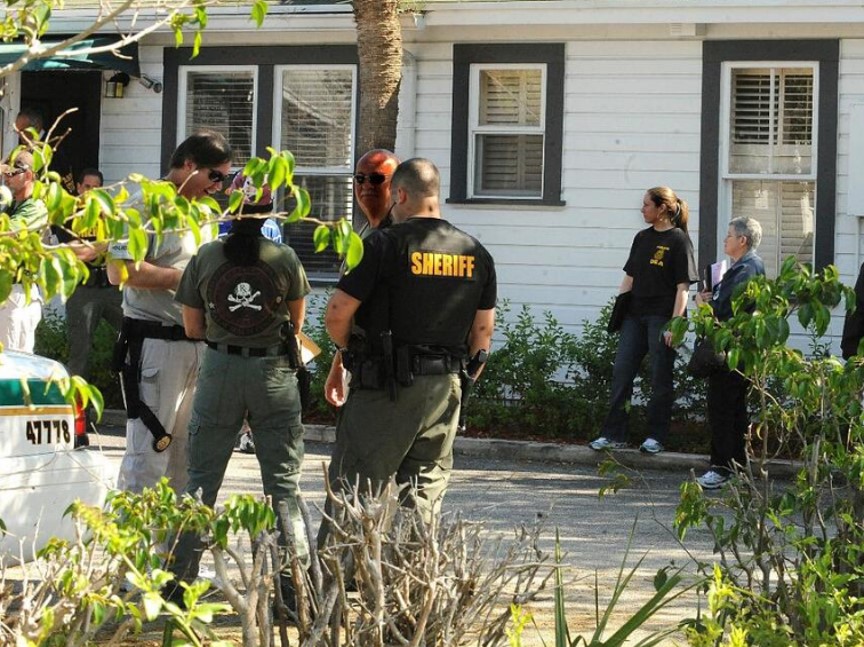
The impact was immediate: Within a year, the number of pain treatment clinics registered with the state fell from 921 to 441; by 2014, there were 371. Jim Hall, a Nova Southeastern University epidemiologist who studies Florida’s drug problems, said any pill mills that didn’t close voluntarily or comply with the new laws got raided.

Law Enforcement Officers Raid Vero Beach Pain Clinic (Elliott Jones, TCPalm, June 27, 2012)
Dr. Bruce Kammerman, Stuart Pain Management Center in Vero Beach, Florida. A yearlong investigation into a pain medication clinic on 21st Street near U.S. 1 culminated in a statewide, multi-agency crackdown from Miami to Pensacola.
The Operation, dubbed Pill Street Blues, resulted in multiple arrests and was one of the largest in the state’s history, Attorney General Pam Bondi said at a news conference at the Indian River County Sheriff’s Office.
Charges included manslaughter charges against a Delray Beach man and a Plantation man for the March 7 death of a Sebastian man, 34-year-old Forrest Cyphers, who was prescribed pills at the Stuart Pain Management Center Inc. clinic in Vero Beach.
State officials said family members made pleas to staff at the Stuart Pain Management Center in Vero Beach to quit prescribing pills to Cyphers. In the wiretap of a phone call between clinic management, they dismissed Cyphers’ death and said, “People die every day,” said Mark Trouville, special agent for the Drug Enforcement Administration.
Bondi said, “These people are despicable, and they’re worse than your typical defendant. They used the trust of the public to distribute drugs to our children.”
Stuart Pain Management Center’s physician, Dr. Bruce Kammerman, of the 2000 block of Southwest Racquet Club Drive, Palm City, was led away in handcuffs. He was charged with 33 offenses, including trafficking a controlled substance and illegally prescribing a controlled substance.
Warrants were served at the clinic and six other clinics, one pharmacy, and five residences in Daytona Beach, Gainesville, Miami, Sarasota, and Fort Myers, said Drug Enforcement Administration spokeswoman Mia Ro. She said all the clinics appear to be connected to illegal or improper dispensing of pain medications. A DEA media release said the clinics were traced to an organization headed by a Pompano Beach Firefighter.
A media release from the DEA said Lewis Stouffer, 32, of Coconut Creek, was in charge of a drug trafficking organization responsible for the diversion of millions of narcotic medications throughout Florida.
In addition, the DEA release said Jeffrey J. Reiter, 54, of Fort Pierce, also faced charges. The release did not specify the charges what his involvement was with the clinics.
Florida Department of Health officials said they issued 12 suspension orders for seven doctors and five clinics statewide.
“It is the largest single-day suspension of physician and clinic licenses ever in the state,” said Danny Hernandez, Chief Legal Council with the Florida Department of Health.
“(The clinic in Vero Beach) is a pill mill masquerading as a legitimate pain management facility” since it opened in 2010, said Vero Beach Police Chief David Currey. “They are driven by greed and have no regard for life.”
He said transactions were cash-only, and a plain-clothed security guard stood outside the front door.
“How many legitimate businesses don’t take insurance?” the police chief said.
The owner of the Vero Beach business, Bruce Paul Karlin, 63, of Delray Beach, and Dr. Roger Lee Gordon, 65, of Plantation, were being charged with the manslaughter of Cyphers. Cyphers was a patient of Gordon’s at the clinic.
“They laughed about his death,” Trouville said. “These people hide behind white coats and diplomas while spreading misery.”
The Florida Department of Health ordered an emergency suspension of Kammerman’s medical license and a suspension of the clinic’s state registration. Kammerman also held a medical license in Georgia. Florida Surgeon General John Armstrong said authorities in Georgia were notified about Kammerman’s charges.
Law enforcement officials from the Vero Beach Police Department, Indian River County Sheriff’s Office, DEA, and Florida Department of Law Enforcement converged on the clinic following the investigation that was aided by the State Attorney’s Office, the Attorney General’s Office, the Division of Insurance Fraud and Florida Department of Health.
The investigation started in Vero Beach in July 2011 and branched statewide. From the time the clinic opened, “We had it on our radar,” Currey said. As officers looked deeper, they began finding connections to other clinics outside Indian River County.
Eventually, six officers (10% of the police force) were assigned to the case and worked with other agencies, including the DEA.
“We are not against legitimate pain clinics with doctors and policies” regulating the prescriptions of pain medications, the police chief said. But Stuart Pain Management was different.
The George Brothers
Christopher George and Jeffrey George, twin brothers, operated, managed, and financed four pain management clinics in Broward and Palm Beach Counties. The George Brothers and their families were targeted in federal and state probes for overprescribing the pills and several overdose deaths. 32 Defendants in connection with charges stemming from Operation Oxy Alley were convicted due to a coordinated investigation into “Pill Mills” in Florida.
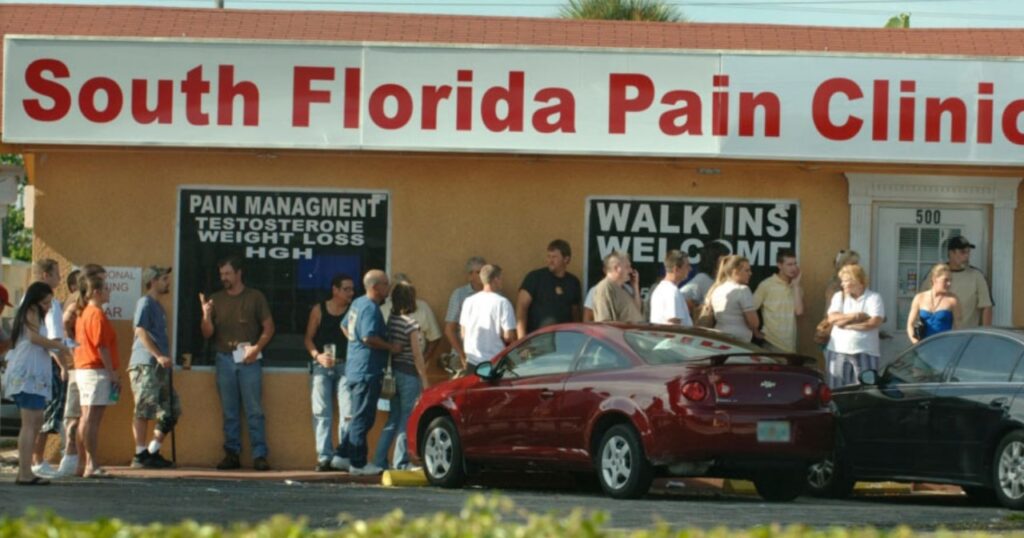
A raid on three South Florida pain clinics that were suspected of illegally distributing millions of prescription pills was the start of what authorities called a massive investigation of such “pill mills.”
“It’s a very good start to what is going to be a long process, but this is just an example of what’s going on,” Palm Beach County Sheriff Ric Bradshaw said. “They represent what the bad pain clinics are doing.”
The raids were part of a multi-jurisdictional investigation that included the U.S. Drug Enforcement Administration and police departments in Broward and Palm Beach counties, which earlier this week took box after box from American Pain, East Coast Pain, and Executive Pain, according to authorities.
All three clinics were owned by 29-year-old twin brothers Christopher and Jeffrey George. American Pain had been in operation for five weeks before the raid.
The 14-month criminal investigation of all three clinics discovered that American Pain had five primary physicians working full-time last year and together administered more than 2 million of the highly addictive oxycodon pills, according to the federal court documents.
The five doctors ranked within the Top 20 Purchasers of Oxycodone, according to DEA statistics. They were each paid anywhere from $860,000 to $1.2 million last year, according to the court documents, alleging that the more patients the doctors saw, the more they were paid.
U.S. District Judge Kenneth A. Marra sentenced four defendants. Christopher Paul George, 30, of Wellington, was sentenced to 210 months in prison, followed by three years of supervised release. Ethan Baumhoff, 40, of Fort Lauderdale, was sentenced to 132 months in prison, followed by three years of supervised release. George and Baumhoff pleaded guilty to one count of racketeering conspiracy in October 2011. Daniel Hauser, M.D., 61, of Hollywood, was sentenced to six months in prison, followed by one year of supervised release. Roni Dreszer, M.D., 36, of Sunny Isle Beach, was sentenced to 72 months in prison, followed by one year of supervised release. Hauser and Dreszer pleaded guilty to one count of conspiracy to commit money laundering in October 2011.
From 2008 to early 2010, these pill mills distributed approximately 20 million oxycodone pills and made more than $40 million from the illegal sales of controlled substances. Thirteen of the 32 defendants were doctors.
Thirty-two defendants, including 13 doctors, were charged in an indictment for their participation in, among other things, the illegal distribution of pain killers and steroids through pill mills operating in Broward and Palm Beach Counties in Florida and through the Internet, respectively.
To execute the scheme, the defendants hired complicit doctors who agreed from as early as their job interviews to prescribe oxycodone and other controlled substances to patients without regard to medical necessity, with only a cursory physical examination of the patient, and in violation of numerous federal and state laws and DEA regulations regarding the storage and distribution of controlled substances.
According to the indictment, by 2010, the complicit doctors were allegedly examining close to 500 patients each day at just one clinic, the American Pain Clinic. In fact, from July 2008 through March 2010, approximately 66,871 prescriptions were allegedly filled from the American Pain Clinic. Of the prescriptions filled at American Pain Clinic, approximately 96% were for either oxycodone or alprazolam. Moreover, about 80% of the prescriptions filled at American Pain Clinic were for individuals who listed an address outside of Florida.
The government seized approximately $4.7 million in cash from the defendants’ residences, various houses, and expensive automobiles worth more than $9 million. The indictment also sought the forfeiture of approximately $40 million in cash and assets, representing the illegal proceeds of the pill mill operations.
U.S. Attorney Ferrer stated, “These defendants showed a callous disregard for the well-being of their patients and the value of human life. For years, they distributed oxycodone and other controlled substances without regard to medical need, without individual treatment plans and physical examinations. Like all drug traffickers, they focused solely on making money and staying out of jail. But thanks to the hard work of our federal and local partners, we are shutting down these dangerous pill mills, seizing their money and assets, and sending the owners, operators, and doctors to jail. You cannot deal drugs hiding behind a medical license.”
United States of America v. Christopher Paul George, Jeffrey George et al. (August 11, 2011)
Christopher George was released from federal prison in February 2022.
Meanwhile, more than a decade after the FBI shut down their operation, Chris George believes he and his brother played no role in the fatal overdoses.
“In the end, it’s their responsibility. They’re responsible for themselves, I’m not,” he said after his release from prison. “I don’t think we created more addicts. They were already here. They just had an easier way to get their drugs. And a safer way. Now they don’t even know what they’re getting.”
Chris George, who is out on parole, continues to deflect blame for his drugs’ deadly toll onto his former patients.
“They said they were in pain to my doctors. They got an MRI showing they were in pain. My doctors gave them medication. What they did with that is out of my hands.
“They act like I’m the bad guy here ‘cause I owned a business,” he added. “You know, in this country, anybody can open a business.”
Florida became a pill popper’s paradise and the main source of an illicit prescription drug pipeline. Lax laws and little oversight led to a booming number of storefront pain management clinics that dispensed painkillers, particularly Oxycodone.
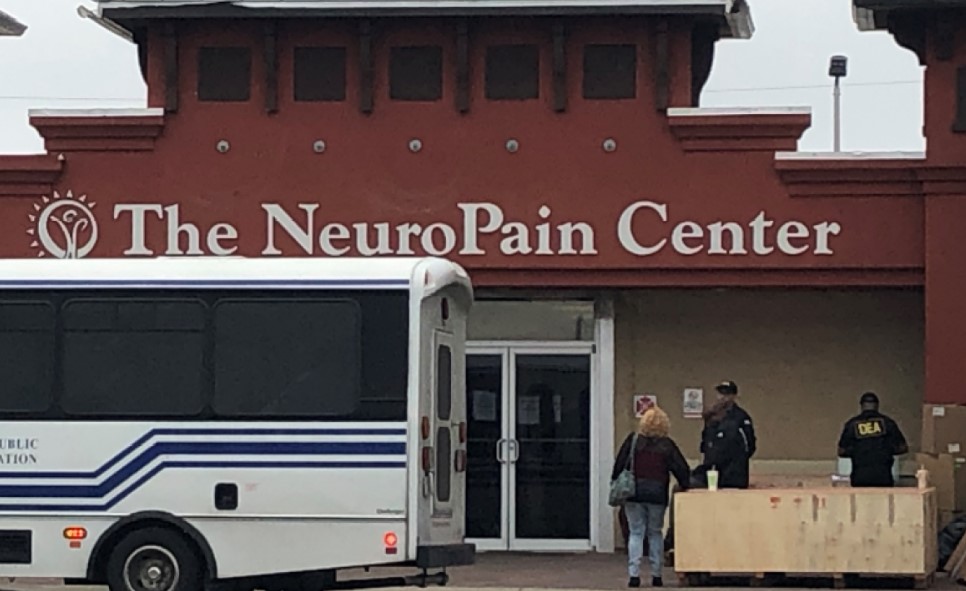
What Are Opioids and Why Are They Dangerous? (Mayo Clinic)
What makes opioid medicines effective for treating pain also can make them dangerous.
At lower doses, opioids may make you feel sleepy. But higher doses can slow your breathing and heart rate, which can lead to death. And the pleasure or feeling high that results from taking an opioid can make you want to continue taking it more often and at higher doses. This can lead to addiction: Your brain and behavior are so badly affected that you can no longer control your use of opioids.
For 5 years, Christian Valdes was at the center of the biggest drug operation in America. It was an operation that became internationally notorious, insanely violent and nonstop freaky. It made its kingpins millions and millions of dollars, and it made Valdes as much money as he could possibly make in a day—because there were endless numbers of people lining up for what he had the power to give them. Those people were willing to do just about anything to get it. With the men, that generally meant money. With the women, that meant money—and almost any kind of sexual arrangement Valdes proposed. And the interesting part about this operation? It was completely legal.
From 2000 to 2009, Florida’s incredibly lax prescription drug laws fueled a huge spike in so-called pain management clinics, especially in the Fort Lauderdale-Miami area. CNN and other national news media outlets tagged these clinics as “Pill Mills” —and with good reason. When Valdes managed them, they gave out heavy-hitter drugs like Xanax, Percocet, Oxycontin, Roxicodone and Methadone just like they were candy. And because the Sunshine State kept everybody in the dark about who was prescribing what, somebody could easily go into one clinic and get some Oxy and then head over to a different clinic for some more a few minutes later. Valdes helped a whole lot of people do just that—including a posse of strippers he sponsored—because he was running his own operation within the operation.
Pill Mill is his no-holds-barred memoir of life in the center of the action as the whole pain clinic scam spiraled out of control. In this book, you’ll hear this full-blooded Cuban’s whole story—from the rough-and-tumble childhood and high school years that shaped him; to how he started dealing weed and eventually began growing it himself; to how he quickly learned how to work the pill mill scam and how he recruited friends and family to help him make the most money in the fastest amount possible; to how Hurricane Wilma almost put him behind bars for who knows how many years. Valdes also reveals the major players behind the pill mill scandals, talks about his frightening and sometimes hilarious conflicts with psychotic junkie patients and takes the reader inside one of the most notorious “Jungle Houses” of the time—a sad excuse for a clinic where junkies zoned out at a backyard barbeque, dozens of drug deals went down, and the owner, the infamous “Pill Mill” Vinny, sat behind a desk with over 200 grand in cash piled on top of it.
For the first time, this book offers an insider’s look at what happened when Florida became ground zero for pain pill abuse. At one point, the country’s top 50 prescription pain pill sellers were ALL in Florida—and 33 of those 50 were in Broward County, where I got involved in the racket. There were more than 150 storefront pain clinics in Broward at the height of the madness.
Generation Oxy: From High School Wrestlers to Pain Pill Kingpins by Douglas Dodd and Matthew B. Cox
This true crime memoir details the three-year-long rise and collapse of the Barabas Criminal Enterprise, an opiod-pill trafficking ring founded by Douglas Dodd and his best friend on the wrestling team, Lance Barabas. Raised by an alcoholic mother and surrounded by drug-abusing relatives, Dodd got involved in narcotics at an early age. Their scheme to sell the drugs he was already consuming coincided with the explosion of prescription addicts who were traveling the “Oxy Express” to Florida for easy access to the pills they dubbed “hillbilly heroin.” Soon they were shipping forty thousand pills a month, with tens of thousands of dollars returning in hollowed-out teddy bears.
Generation Oxy is the story of a group of friends—clean cut, all-American high school kids—who stumbled into the Sunshine State’s murky underworld of illegal pill mills and corrupt doctors. This teenage criminal enterprise ultimately shipped hundreds of thousands of OxyContins and other prescription painkillers throughout the country, making millions in the process.
The good times came to an end when the DEA closed in, and the 20-year-old Dodd faced life in federal prison.
Between 1999 and 2017, an estimated 250,000 Americans died from overdoses involving prescription painkillers, a plague ignited by Purdue Pharma’s aggressive marketing of OxyContin. Families, working class and wealthy, have been torn apart, businesses destroyed, and public officials pushed to the brink. Meanwhile, the drugmaker’s owners, Raymond and Mortimer Sackler, whose names adorn museums worldwide, made enormous fortunes from the commercial success of OxyContin.
In Pain Killer, Barry Meier tells the story of how Purdue turned OxyContin into a billion-dollar blockbuster. Powerful narcotic painkillers, or opioids, were once used as drugs of last resort for pain sufferers. But Purdue launched an unprecedented marketing campaign claiming that the drug’s long-acting formulation made it safer to use than traditional painkillers for many types of pain. That illusion was quickly shattered as drug abusers learned that crushing an Oxy could release its narcotic payload all at once. Even in its prescribed form, Oxy proved fiercely addictive. As OxyContin’s use and abuse grew, Purdue concealed what it knew from regulators, doctors, and patients.
The king of the Florida pill mills was American Pain, a mega-clinic expressly created to serve addicts posing as patients. From a fortress-like former bank building, American Pain’s doctors distributed massive quantities of oxycodone to hundreds of customers a day, mostly traffickers and addicts who came by the vanload. Inked muscle-heads ran the clinic’s security. Former strippers operated the pharmacy, counting out pills and stashing cash in garbage bags. Under their lab coats, the doctors carried guns—and it was all legal… sort of.
American Pain was the brainchild of Chris George, a 27-year-old convicted drug felon. The son of a South Florida home builder, Chris George grew up in ultra-rich Wellington, where Bill Gates, Springsteen, and Madonna kept houses. Thick-necked from weightlifting, he and his twin brother hung out with mobsters, invested in strip clubs, brawled with cops, and grinned for their mug shots. After the housing market stalled, a local doctor clued in the brothers to the burgeoning underground market for lightly regulated prescription painkillers. In Florida, pain clinics could dispense the meds, and no one tracked the patients. Seizing the opportunity, Chris George teamed up with the doctor, and word got out. Just two years later Chris had raked in $40 million, and 90 percent of the pills his doctors prescribed flowed north to feed the rest of the country’s insatiable narcotics addiction. Meanwhile, hundreds more pain clinics in the mold of American Pain had popped up in the Sunshine State, creating a gigantic new drug industry.
American Pain chronicles the rise and fall of this game-changing pill mill, and how it helped tip the nation into its current opioid crisis, the deadliest drug epidemic in American history. The narrative swings back and forth between Florida and Kentucky, and is populated by a gaudy and diverse cast of characters. This includes the incongruous band of wealthy bad boys, thugs and esteemed physicians who built American Pain, as well as penniless Kentucky clans who transformed themselves into painkiller trafficking rings. It includes addicts whose lives were devastated by American Pain’s drugs, and the federal agents and grieving mothers who labored for years to bring the clinic’s crew to justice.
AMERICAN PAIN ON AMAZON PRIME VIDEO
American Pain is a one-stop shop, supplying both prescriptions and painkillers. At the door, a hulking bouncer warns people not to snort their pills in the parking lot. That would attract the kind of attention that the clinic’s owners, twin brothers Chris and Jeff George, are trying to avoid.
But it’s too late. Local and federal investigators are nearby, watching every move.
These are scenes from a new CNN Films documentary, “American Pain,” which details the George brothers’ rise and fall as opioid kingpins.
“They became the largest street-level distribution group operating in the entire United States,” McKenzie added. “Nobody put more pills on the streets than they did. Nobody … and they were operating in broad daylight.”
These cases serve as an important reminder that healthcare professionals have a duty to prescribe medication responsibly to ensure the well-being of patients under their care. Failing to do so can endanger patients and undermine critical, ongoing public health measures to address the illegal distribution of opioids.
The abuse of prescription drugs, especially opioids, is a serious problem in our states and local communities.
Understanding Drug Overdoses and Deaths (Centers for Disease Control and Prevention)
What is Oxycodone and How Is It Used (United States Drug Enforcement Administration)
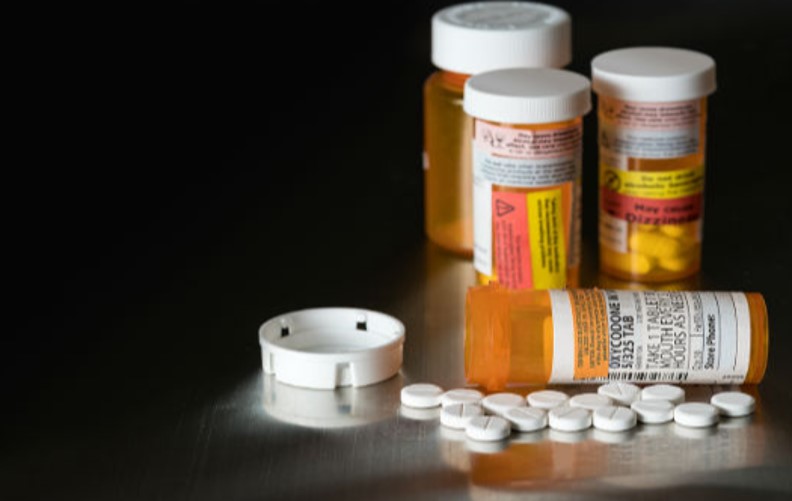
While there are plenty of legitimate pain clinics affiliated with hospitals and hospices, pill mills are distinctly different operations that dole out scores of narcotics, such as Oxycodone, OxyContin, and Xanax.
Following the crackdown on pill mills in Florida, Georgia became an attractive haven for them because the state had been slow to implement measures like a statewide database to track prescriptions and strict regulations for pain clinics.
According to the National Drug Intelligence Center, an estimated 7,500 pill mills operate in the United States.
If you are aware of controlled substance violations in your community, you can submit your anonymous tip through the DEA online Tip Line.
A Pill Mill is a type of business that prescribes narcotic medications in more significant numbers than would be prescribed in regular physician offices. State and local investigators came up with the name “pill mills.” The doctors at the pill mills don’t offer education on the drugs or warnings about taking the drugs. They are often given cash, which is one reason the pill mills make so much money. Most of these doctors, clinics, and pharmacies think of an addiction as profitable. They mostly give out prescriptions for drugs like oxycodone. Some patients will travel a long way just because there aren’t any questions asked at the pill mills. Some even drive from another state to get drugs from these doctors. Doctors and their co-conspirators need to be stopped. They cast a long shadow on the work of every other physician trying to help patients.

The operation of a drug trafficking network peddling prescription drugs for profit under the guise of a medical practice not only violates the law, it undermines the public confidence in the healthcare profession.
The opioid crisis and drug overdoses continue to devastate our states and local communities.
Donations to Support this Website are Always Welcome.
Related Investigations
How Authorities Have Shuttered Georgia Pain Clinics Massive Pain Pill Distribution
How to Recognize a Pain Pill Mill in Your Community
Authorities Crack Down on Pharmacists Fulfilling and Dispensing Massive Amounts of Pain Pills
How Federal Agencies are Shutting Down Maryland Pain Clinics Operating as Pill Mills
How Authorities Are Cracking Down on Virginia Pain Clinics Massive Pain Killer Pill Operations
How Authorities Are Shutting Down Texas Pain Clinics Enormous Pill Prescriptions
How State and Federal Authorities are Dismantling Pill Mills in the United States
How Pain Clinic Owners Turned Patients’ Pain into Enormous Profits
George Brothers Used Pain Clinics to Disburse Oxycodone Pain Killer Pills in Florida
Authorities Crack Down on Rogue Pain Clinics in Florida
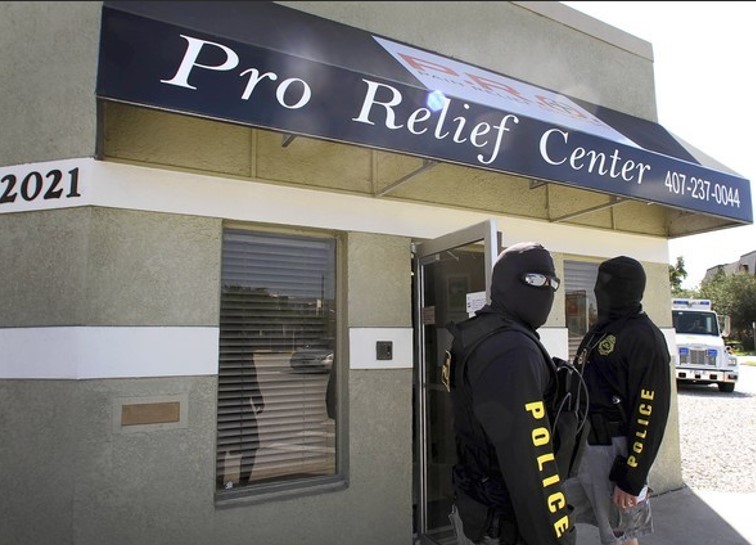
ADD COMMENTS BELOW
- Essential Christmas Songs for the Holiday Season
- Stylish Outdoor Fire Pits and Patio Heaters
- How to Create an Ergonomic Workspace at Home or Work
- Benefits of Humor and Laughter in Life
- Balancing Success: Practical Self-Care Strategies for Entrepreneurs
- Guides to Backpacking, Mountain Biking and Hiking Georgia
- Ways to Pay It Forward and Change Lives
- Email Marketing Campaigns for Small Business Owners
- Guide to Martha Stewart’s Hugely Successful Concept and Art of Presentation
- Guides to Backpacking and Hiking Canada
- Timeline of Events Leading to Rudy Giuliani’s Legal Troubles
- Backpacking, Hiking, and Camping Safety Guides
- Moving and Relocating to Atlanta: How to Find Your New Home
- Money Matters: Insider Tips to Buying a Home
- Renting vs Owning a Home
- Ways to Build Positive Credit
- Do It Yourself Credit Improvement Process
- A Trail of Clues to the Murder of Nicole Brown Simpson
- How Centra Tech’s Bitcoin Cryptocurrency Scheme Was Hatched and Discovered
- Starting a New Business as a New Mother: Tips for Thriving
- Guides to Backpacking and Hiking the Carolinas
- Guides to Hiking New York State and New Jersey
- Guides to Hiking California and Nevada
- The Tragic Murder of Rebecca Postle Bliefnick
- How a Grad Student Murder Spotlights Female Joggers’ Safety Concerns
- How Massive Commercial Financial Fraud Was Discovered in Singapore
- Did Billy Ray Turner Conspire with Sherra Wright to Kill Former NBA Player Lorenzen Wright?
- How Operation Rebound’s 7-Year Cold Case was Finally Solved
- Mastering DIY Marketing: Essential Skills and Strategies for Small Business Owners
- How a GeoLocation Expert Tracked a Killer
- Transgender Law Enforcement Officer Denied Medical Coverage for Gender Dysphoria
- How Video Surveillance Cameras Helped Identify and Track a Killer
- How Investigators Solved the Murder Mystery of Army Sergeant Tyrone Hassel III
- How a Love Obsession Led to the Brutal Murder of Anna Lisa Raymundo
- How Stephen Grant Tried to Get Away with Killing His Wife
- How Unrelenting Catfish Schemes Led to Fatal Suicide
- How Pain Clinic Owners Turned Patients’ Pain into Enormous Profits
- How to Recognize a Pain Pill Mill in Your Community
- How Authorities Have Shuttered Georgia Pain Clinics Massive Pain Pill Distributions
- How Pain Doctors Massive Opioid Prescriptions Lead to Pain Pill Overdose Deaths
- How Authorities Are Dismantling Pennsylvania Pain Clinics Prescribing Excessive Amounts of Opioid Pain Pills
- How Authorities Are Dismantling Alabama Pain Clinics Pain Pill Schemes
- How the Gilgo Beach Homicide Investigation Has Progressed
- How NYC Architect was Linked to Three Women’s Remains Found on Gilgo Beach
- How Investigators Discovered a Serial Killer Hiding in Plain Sight
- How Police Discovered the Concealed Murders of the Chen Family
- How a Vicious Child Custody Battle Led to the Murder of Christine Belford
- How Authorities Finally Captured a Serial Killer in Southern Louisiana
- How Authorities Are Busting Pill Mills in The Carolinas
- How Montgomery County Police Quickly Unraveled the Murder of a Retail Store Employee in Bethesda
- How a Child Rapist and Murderer Almost Got Away with His Crimes in England
- How Authorities Are Dismantling Pill Mills in the United States
- How Federal Agencies Are Dismantling Michigan Pain Clinic Doctors Scheme to Distribute Enormous Amounts of Opioid Pain Pills
- How Authorities Are Cracking Down on Virginia Pain Clinics Massive Pain Pill Operations
- How Authorities Are Honing in on Kentucky Pain Clinics Distributing Opioid Painkiller Pills for Profit
- How Federal Agencies Are Shutting Down Maryland Pain Clinics Operating as Pill Mills
- How Federal Agencies Are Dismantling New York Pain Clinics Vast Pain Pill Operations
- How the Senseless Murder of Tequila Suter Was Quickly Solved
- How Authorities Are Dismantling Ohio Pain Clinics Prescribing Excessive Pain Pills
- How Authorities are Dismantling Tennessee Pain Clinics Prescribing Massive Quantities of Opioid Pain Pills
- How State and Federal Agencies Are Shuttering California Pain Clinics Huge Distribution of Opioid Pain Pills
- How Authorities Are Shutting Down Texas Pain Clinics Enormous Pill Prescriptions
- How Authorities Are Cracking Down on Rogue Pain Clinics in Florida
- George Brothers Used Pain Clinics to Disburse Oxycodone Pain Killer Pills
- How Authorities Have Convicted Pharmacists Fulfilling and Dispensing Massive Amounts of Pain Pills
- Georgia Election Workers Defamation Lawsuit and Trial
- Rudy Giuliani’s Election Fraud Allegations and Ensuing Lawsuits
- British Singer George Michael’s Last Christmas
- Shaping Tomorrow’s Leaders
- Kathleen Peterson’s Mysterious Staircase Death: Accident or Homicide?
- How Police Officer Stephanie Lazarus Almost Got Away with Murder
- Mysterious Staircase Death Investigations
- Elizabeth Ratliff’s Mysterious Staircase Death in Germany
- The Death of Vincent Foster Remains a Mystery 30 Years Later
- Biloxi Murder Conspiracy: A High-Stakes Crime